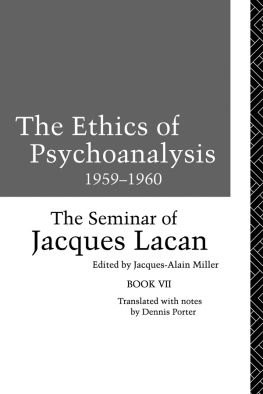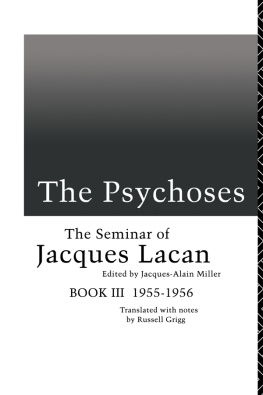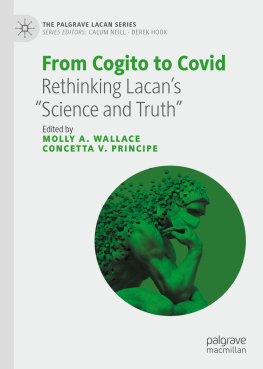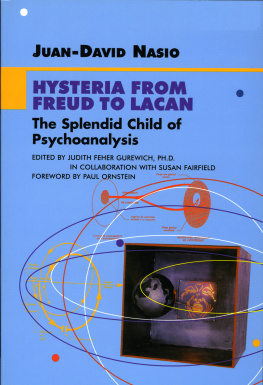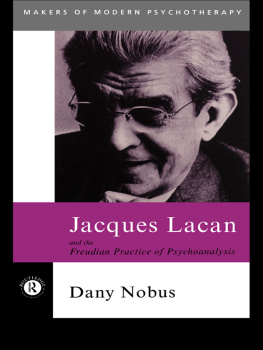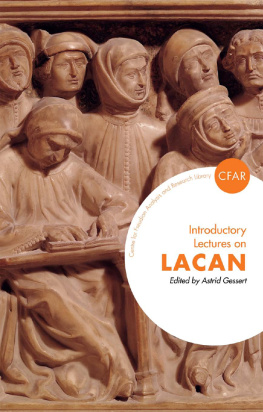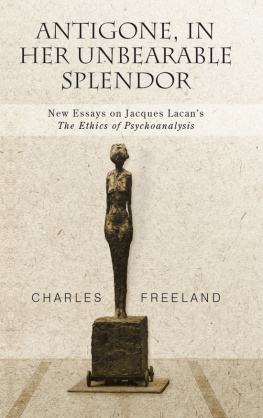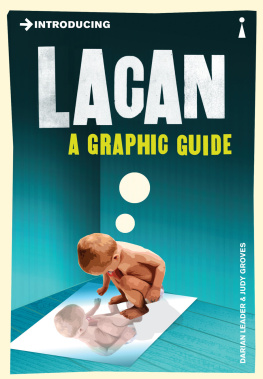Lacan - The Ethics of Psychoanalysis 1959-1960
Here you can read online Lacan - The Ethics of Psychoanalysis 1959-1960 full text of the book (entire story) in english for free. Download pdf and epub, get meaning, cover and reviews about this ebook. publisher: Taylor and Francis, genre: Science. Description of the work, (preface) as well as reviews are available. Best literature library LitArk.com created for fans of good reading and offers a wide selection of genres:
Romance novel
Science fiction
Adventure
Detective
Science
History
Home and family
Prose
Art
Politics
Computer
Non-fiction
Religion
Business
Children
Humor
Choose a favorite category and find really read worthwhile books. Enjoy immersion in the world of imagination, feel the emotions of the characters or learn something new for yourself, make an fascinating discovery.
The Ethics of Psychoanalysis 1959-1960: summary, description and annotation
We offer to read an annotation, description, summary or preface (depends on what the author of the book "The Ethics of Psychoanalysis 1959-1960" wrote himself). If you haven't found the necessary information about the book — write in the comments, we will try to find it.
The Ethics of Psychoanalysis 1959-1960 — read online for free the complete book (whole text) full work
Below is the text of the book, divided by pages. System saving the place of the last page read, allows you to conveniently read the book "The Ethics of Psychoanalysis 1959-1960" online for free, without having to search again every time where you left off. Put a bookmark, and you can go to the page where you finished reading at any time.
Font size:
Interval:
Bookmark:
The Ethics of Psychoanalysis 19591960

The Seminar of Jacques Lacan
BOOK VII
Given all that is implied by the phrase, the ethics of psychoanalysis will allow me, far more than anything else, to test the categories that I believe enable me to give you through my teaching the most suitable instruments for understanding what is new both in Freuds work and in the experience of psychoanalysis that derives from it.
With these words Jacques Lacan begins his famous seminar on ethics, in which he discusses the problem of sublimation, the paradox of jouissance, the essence of tragedy (a reading of Sophocless Antigone), and the tragic dimension of analytical experience. Delving into the psychoanalysts inevitable involvement with ethical questions and the attraction of transgression, Lacan clarifies many of his key concepts, as well as his criticisms of certain trends in psychoanalysis. One of the most influential French intellectuals of this century, Lacan is seen here at the height of his powers.
By Jacques Lacan
TELEVISION
THE SEMINAR OF JACQUES LACAN BOOK I
THE SEMINAR OF JACQUES LACAN BOOK II
ECRITS: A SELECTION
FEMININE SEXUALITY
THE FOUR FUNDAMENTAL CONCEPTS OF PSYCHO ANALYSIS
THE ETHICS OF
PSYCHOANALYSIS
19591960
The Seminar of Jacques Lacan
Edited by Jacques-Alain Miller
BOOK V
Translated with notes by
Dennis Porter

Originally published in French as Le Seminaire, Livre VII
Lethique de la psychanalyse, 19591960 by
Les Editions du Seuil, Paris, 1986
First published in English translation in 1992
Published in the US by W.W. Norton & Company, Inc., New York
Published in the UK by Routledge
27 Church Road, Hove, East Sussex, BN3 2FA
270 Madison Ave, New York NY 10016
Routledge is an imprint of the Taylor & Francis Group, an informa business
Reprinted 1999
Transferred to Digital Printing 2010
English translation W.W. Norton & Company, Inc., 1992
All rights reserved. No part of this book may be reprinted or reproduced or utilized in any form or by any electronic, mechanical, or other means, now known or hereafter invented, including photocopying and recording, or in any information storage or retrieval system, without permission in writing from the publishers.
British Library Cataloguing in Publication Data
A catalogue record for this book is available from the British Library
ISBN 9780415090544 (pbk)
Publishers Note
The publisher has gone to great lengths to ensure the quality of this reprint but points out that some imperfections in the original may be apparent.

Some of the problems of translating Jacques Lacans Seminars into English have already been pointed out by the translators of Seminars I and II, John Forester and Sylvana Tomaselli, and there is no point in repeating their helpful comments here. It is, however, important to recall that the Seminars now in the process of being translated were delivered from notes to an audience that for the most part had been following the progress of Lacans thought over many years and was composed to a great extent of psychoanalysts or psychoanalysts in training. These circumstances account in part for his non-academic mode of exposition and the frequent complexity of the syntax. They also explain the closeness Lacan apparently felt to his audience, the assumptions he was able to make about the knowledge his listeners possessed, the frequent references to previous Seminars or to other activities of the Socet Franaise de Psychanalyse, and the apparent allusiveness of some of his remarks. The latter in particular seems to derive both from what he felt he could take for granted among those who knew his work well and from a pedagogical style that made great demands on a listener.
Jacques-Alain Millers French edition of the Ethique de la Psychanalyse is without a critical apparatus, like the other Lacan Seminars that have so far been published. Miller reproduces Lacans lectures virtually unmediated, and it seemed proper to model the English edition of the work on the French. As a consequence, footnotes have been kept to a minimum; they are chiefly limited to linguistic difficulties where for one reason or another English is unable to render fully the significance of the Frenchthe most obvious of such cases is Lacans not infrequent plays on words. However, a bibliography of authors and works cited by Lacan in the course of the Seminar is included. I have also followed the French edition in leaving German and Greek words in the original where Lacan did so in the context of analyzing German or Greek texts; in most cases, he gave at the same time a French equivalent or a paraphrase of a concepts meaning. Only in the case of titles have I given the English translation in brackets after the first occurrence.
The task of the translator is, I take it, a critically self-effacing one that insofar as possible avoids the temptation to play editor by reducing ambiguities or by naturalizing the strangeness of an original in its passage into the native idiom. Thus, the goals I gave myself were accuracy rather than elegance and a flexibility of tone that matches the different registers of Lacans expository style. The excitement for those who encounter his Seminars in the original French is in the experience of a thought in the making. And it is important to render in the English this liveliness of a distinguished mind at work before an audience, even at the occasional cost of some awkwardnesses. The difficulty was in trying to render in a different linguistic code a captivating spoken word that sometimes meanders, throws out asides, refers backwards or anticipates future problems, moves through passages dense with difficult ideas, narrates an illustrative comic anecdote, draws out the forgotten etymological significance of a word or resorts suddenly to popular speech. The pleasure for the translator is in discovering equivalents for such movements within the very different resources of his own language.
It is for the most part not Lacans psychoanalytic or philosophical discourse that causes difficulties, but his syntax and, given that the Norton edition of the Seminars has as its potential audience the English-speaking world as a whole, his use of familiar language and colloquialisms. As far as the former is concerned, Lacan frequently uses French prepositions and prepositional phrases in startlingly new ways; thus one of the most difficult words to translate turned out to be de. As for Lacans colloquialisms, it seemed to me important wherever possible to find equivalents that were not too obviously recognizable as Americanisms or as Britishisms, but have a more general currency. Finally, a few minor errors in the French have been corrected in the translation.
I would like to thank my colleague Edward S. Phinney for help with the Greek and Susan Barrows both for her editorial support and for a careful reading of the manuscript.
DENNIS PORTER
Amherst, Massachusetts, October 1991

I announced that the title of my seminar this year was The Ethics of Psychoanalysis
Next pageFont size:
Interval:
Bookmark:
Similar books «The Ethics of Psychoanalysis 1959-1960»
Look at similar books to The Ethics of Psychoanalysis 1959-1960. We have selected literature similar in name and meaning in the hope of providing readers with more options to find new, interesting, not yet read works.
Discussion, reviews of the book The Ethics of Psychoanalysis 1959-1960 and just readers' own opinions. Leave your comments, write what you think about the work, its meaning or the main characters. Specify what exactly you liked and what you didn't like, and why you think so.

